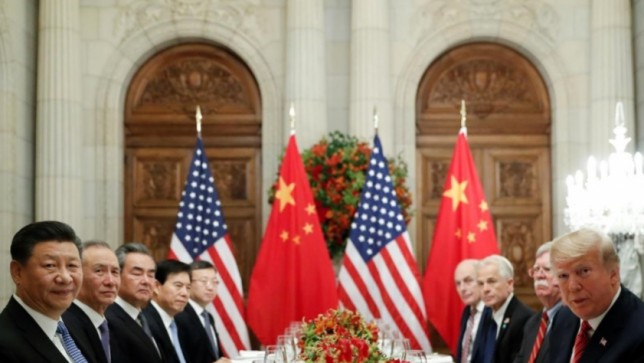China presses Trump for more tariff roll-backs in ‘phase one’ trade deal

China is pushing US President Donald Trump to remove more tariffs imposed in September as part of a “phase one” US-China trade deal, people familiar with the negotiations said on Monday.
The deal, which may be signed this month by Trump and Chinese President Xi Jinping at a yet-to-be determined location, is widely expected to include a US pledge to scrap tariffs scheduled for Dec. 15 on about $156 billion (£121 billion) worth of Chinese imports, including cell phones, laptop computers and toys.
A US official said the fate of the Dec. 15 tariffs is being considered as part of negotiations and a potential signing trip this month.
Another source briefed on the talks said Chinese negotiators want Washington to drop 15 percent tariffs on about $125 billion worth of Chinese goods that went into effect on Sept. 1. They are also seeking relief from earlier 25 percent tariffs on about $250 billion of imports from machinery and semiconductors to furniture.
A person familiar with China’s negotiating position said it is continuing to press Washington to “remove all tariffs as soon as possible.”
China’s request to remove the Sept. 1 duties was earlier reported by Politico, citing sources. The Financial Times newspaper also reported the White House was considering whether to roll back the Sept. 1 tariffs, which cover some clothing items, flat-screen televisions, smart speakers and Bluetooth headphones.
Geng Shuang, a spokesman at the Chinese foreign ministry, said the two sides remained in touch.
“Trade consultations have made progress and are advancing in accordance to plan,” Geng said.
On the tariff issue, Geng said he could only give an answer “in principle”.
“Adding tariffs is not the correct way to resolve trade issues,” he told reporters at a regular briefing in Beijing on Tuesday.Taoran Notes, an influential WeChat account run by China’s Economic Daily, said the removal of the additional tariffs already imposed by the United States was China’s “most core concern”.
“Any miscalculation on this issue could well cause further back and forth in the consultations,” it wrote.
Ralph Winnie, director of the China programme at the Eurasia Center, said wrapping up the interim trade pact would provide a boost to both the US and Chinese economies, while handing Trump an important win among farmers - a core constituency.
“It’s in both countries’ interest to have this trade deal,” Winnie said. “If he seals the deal, it will be looked on very favourably by the American people. It’s a win-win for both countries.”
Speaking on Tuesday at an import fair aimed at burnishing China’s free-trade credentials, President Xi Jinping called on countries to stand against protectionism and reiterated pledges to open China’s economy and strengthen protection of intellectual property rights.
Foreign governments and business groups have become sceptical of Chinese reform promises and have longed warned that China would invite retaliation if it didn’t match the openness of its trading partners.
